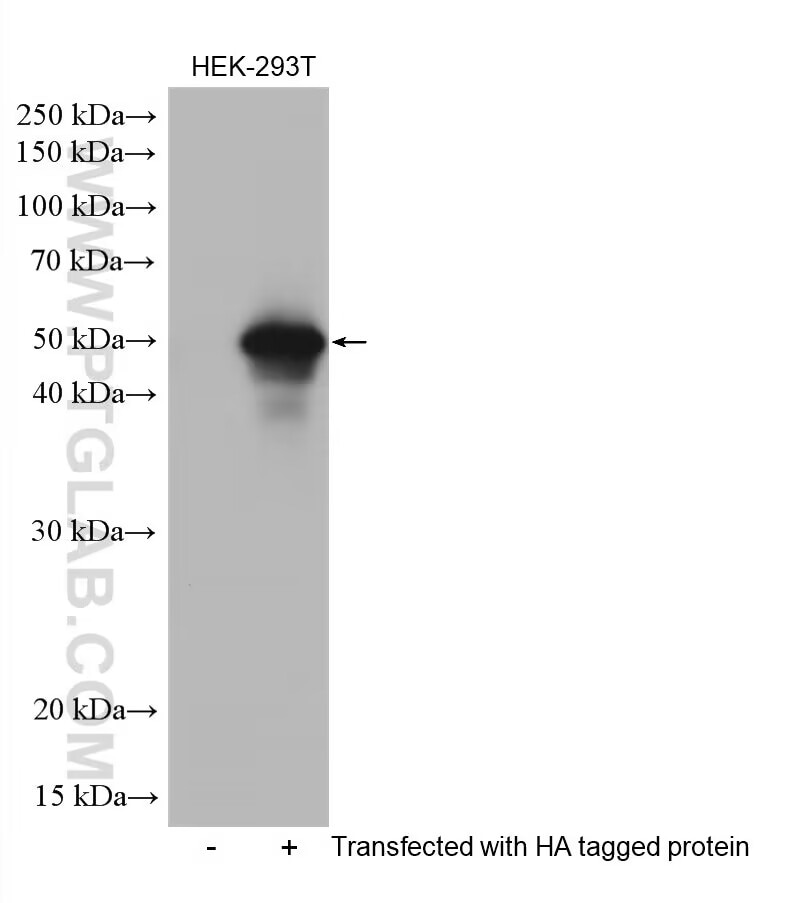HA Tag Rekombinanter Antikörper
HA Tag Rekombinant Antikörper für WB
Wirt / Isotyp
Kaninchen / IgG
Getestete Reaktivität
rekombinanten Protein
Anwendung
WB, IP, CoIP
Konjugation
HRP
CloneNo.
6I21
Kat-Nr. : HRP-81290
Synonyme
Geprüfte Anwendungen
| Erfolgreiche Detektion in WB | Transfected HEK-293T cells |
Empfohlene Verdünnung
| Anwendung | Verdünnung |
|---|---|
| Western Blot (WB) | WB : 1:5000-1:50000 |
| It is recommended that this reagent should be titrated in each testing system to obtain optimal results. | |
| Sample-dependent, check data in validation data gallery | |
Veröffentlichte Anwendungen
| WB | See 10 publications below |
| IP | See 3 publications below |
| CoIP | See 1 publications below |
Produktinformation
HRP-81290 bindet in WB, IP, CoIP HA Tag und zeigt Reaktivität mit rekombinanten Protein
| Getestete Reaktivität | rekombinanten Protein |
| Wirt / Isotyp | Kaninchen / IgG |
| Klonalität | Rekombinant |
| Typ | Antikörper |
| Immunogen | Peptid |
| Vollständiger Name | HA Tag |
| Gene symbol | HA Tag |
| Gene ID (NCBI) | 6 |
| Konjugation | HRP |
| Form | Liquid |
| Reinigungsmethode | Protein-A-Reinigung |
| Lagerungspuffer | PBS with 50% glycerol, 0.05% Proclin300, 0.5% BSA |
| Lagerungsbedingungen | Bei -20°C lagern. Vor Licht schützen. Nach dem Versand ein Jahr stabil. Aliquotieren ist bei -20oC Lagerung nicht notwendig. 20ul Größen enthalten 0,1% BSA. |
Hintergrundinformationen
Protein tags are a protein or peptide sequences located either on the C- or N- terminal of the target protein, which can facilitate solubility, detection, purification, localization, and expression of the target protein. The HA tag corresponds to amino acid residues YPYDVPDYA of a surface glycoprotein -human influenza virus hemagglutinin (HA). The HA tag is commonly used for a variety of research applications including chromatin immunoprecipitation, ELISA, flow cytometry, western blotting, immunocytochemistry/immunofluorescence among of others.
Publikationen
| Species | Application | Title |
|---|---|---|
Cell Death Dis USP3 promotes DNA damage response and chemotherapy resistance through stabilizing and deubiquitinating SMARCA5 in prostate cancer | ||
J Virol RNASEK interacting with PEDV structural proteins facilitates virus entry via clathrin-mediated endocytosis | ||
Theranostics USP14 modulates stem-like properties, tumorigenicity, and radiotherapy resistance in glioblastoma stem cells through stabilization of MST4-phosphorylated ALKBH5 | ||
PLoS Genet Evolution of canonical circadian clock genes underlies unique sleep strategies of marine mammals for secondary aquatic adaptation | ||
Int J Mol Sci CircMTA2 Drives Gastric Cancer Progression through Suppressing MTA2 Degradation via Interacting with UCHL3 |


